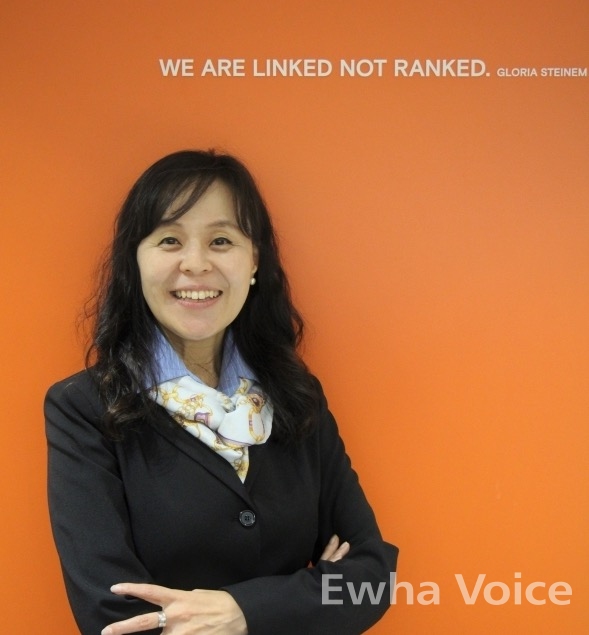
Choi Susannah, a civic activist and director general of the National YWCA (Young Women’s Christian Association) of Korea, shared her experience and vision as a civic activist in Korea in an interview with Ewha Voice.
A graduate of the Department of Christian Studies in 1993, Choi started her career as a civic activist at the Seoul YWCA in 1996.
“Civic activists are people who represent the will of citizens,” Choi said. “We collect issues from regions, spread issues from the center to the regions, and work together internationally to inspire one another. That is the basic exercise.”
Choi explained that the YWCA’s major movements revolve around three big issues: gender, climate, and peace in the Korean peninsula. Amid controversy over the current government’s policy to abolish the Ministry of Gender Equality and Family, the YWCA has staged a two-person protest every lunchtime, conveyed its opinions to lawmakers, encouraged citizens to participate in sending text messages to express disapproval of the decision, and held protests of various sizes and scales in Seoul.
She went on to explain how the other two agendas, climate issues and peace in the Korean peninsula, are relevant to gender problems in Korea. As all are aware, the climate is a global issue that urgently needs to be tackled. Thus, refraining from using disposable cups and other such actions are important.
However, the thing is that the pressure to be eco-friendly is likely to be imposed more on housekeeping females, according to Choi. There is no definitive data on how much is practically recycled from what they recycle, and this is where she calls for the government to make policy-level changes to enable every person to engage equally in these issues.
She continued explaining how the history of war on the Korean peninsula is also connected to gender issues in Korea. In wartime, females are usually deemed as the weak or survivors. However, she thinks women can transgress this limitation and rather take initiative in the movement toward peace.
“When unification happens, chances are that the emergent society will be just an extension of the same patriarchal society in which structural problems still exist, which is not the future we hope will come true,” Choi said. “Thus, we try to think with people about what a better post- unification society should be like, rather than just blind unification.”
Choi stated that the ultimate purpose of the civic movement is to demand recognition of structural problems in society and advance practical suggestions. However, this requires vigilance and constant studying to keep up with issues in society and deal with them sensitively.
“For example, since I majored in a liberal arts field, I have to study things I never studied at school when advancing the Anti-Nuclear Energy and Climate Justice movement, because this field requires more scientific knowledge,” she recalled. “We need to keep an eye on how situations are going, so I think civic activists always need to be more aware than people in any other career.”
Choi also shared an episode when she was picketing. “Once I was on a road holding a picket sign saying, ‘climate justice’ in Korean and a foreign resident came by and asked in clumsy Korean, ‘What is this?’ So, I told him it says ‘climate justice.’ and the guy left nodding, saying, ‘I see,’” she laughed. “Since the climate is a global issue, it was a moment I confirmed global empathy.” she added.
Of her memories at Ewha, she said her experience of learning feminist theology impacted her greatly in pursuing her career, which is to create a better society through the Christian vision. The Bible contains many patriarchal elements when interpreted literally, but when she was a graduate student in the Department of Christian Studies, feminist theology provided her with a whole new point of view on how The Bible can be interpreted and a more integral understanding of Christian values.
Lastly, Choi provided insights on how the civic movement in the present day shows different aspects from that of the past. When she was a student, she also participated actively in student demonstrations common to the era.
“Back then, civic movements were more of a student demonstration and had vigorous and anti- something aspects,” Choi said. “However, these days civic movements exhibit more alternative aspects, in which we shape ideas for proceeding to a better society. Looking back at candlelight protests in the past few years, these days protests are more like a field of festivals where people speak out.”
For students interested in engaging in social matters, Choi encouraged them by saying anyone can live the values of the civic movement.
“To realize the values of justice, peace, and life through your job and thus lead the transformation of society is the true civic movement I think.”

